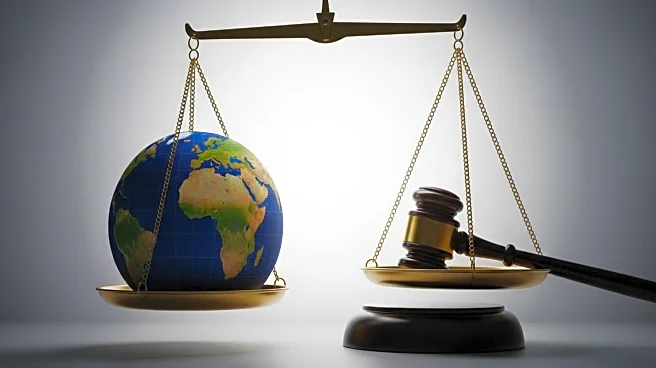What is the story about?
What's Happening?
A federal appeals court has ruled that President Trump exceeded his authority by imposing sweeping tariffs under the guise of national emergencies. The U.S. Court of Appeals for the Federal Circuit upheld a previous decision by a specialized federal trade court, which found that Trump's tariffs, imposed on nearly all U.S. trading partners, were not justified under the 1977 International Emergency Economic Powers Act. The ruling allows time for an appeal to the U.S. Supreme Court, but it represents a significant setback for Trump's trade policies, which have been characterized by unpredictability and have affected financial markets and businesses. The tariffs, initially set at up to 50% for countries with trade deficits with the U.S., were suspended for 90 days to allow for negotiations, resulting in some countries agreeing to new trade deals.
Why It's Important?
The court's decision has substantial implications for U.S. trade policy and economic strategy. If the tariffs are ultimately revoked, the U.S. Treasury may face the challenge of refunding billions in collected import taxes, potentially leading to financial strain. The ruling also undermines a key component of Trump's negotiating strategy, which could embolden foreign governments to resist future U.S. demands or renegotiate existing agreements. The decision highlights the limits of presidential power in trade matters and could influence how future administrations approach tariff imposition and international trade negotiations.
What's Next?
President Trump has indicated plans to appeal the decision to the U.S. Supreme Court, arguing that the ruling could have dire consequences for the United States. The administration may explore alternative legal avenues to impose tariffs, such as the Trade Act of 1974 or Section 232 of the Trade Expansion Act of 1962, though these options come with restrictions. The outcome of the appeal and any subsequent legal actions will be closely watched by businesses, trade partners, and policymakers, as they could reshape the landscape of U.S. trade policy.
Beyond the Headlines
The ruling raises questions about the balance of power between the executive branch and Congress in setting trade policy. It also reflects broader concerns about the use of emergency powers to bypass legislative processes. The decision may prompt discussions on the need for clearer guidelines and limitations on presidential authority in economic matters, potentially leading to legislative reforms.















